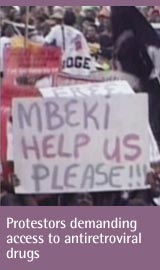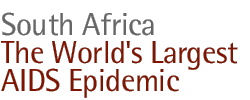Living with HIV (2005)*: 5.5 million (18.8% pop.)
Receiving Drugs (2005): 178,000-235,000 (21% of those who need them)
Est. AIDS Deaths (2005): 320,000

By the early 1990s, the danger of HIV was clear. The virus had already decimated the gay, hemophiliac, and injecting drug user communities in the United States and Europe. HIV prevalence rates in countries surrounding South Africa were frightening.
But South Africa was in the middle of a historic transition from 40 years of a brutal apartheid government to a new, democratic one led by Nelson Mandela. Although South African AIDS activists hoped he would address the growing numbers of HIV cases, Mandela's government, which took power in 1994, had much to occupy its attention; AIDS fell low on the agenda. Mandela barely mentioned the disease during his presidency, and delegated the AIDS portfolio to his deputy president, Thabo Mbeki. During Mandela's tenure, infection rates doubled every year.
In 1999, after campaigning on a platform promising action against AIDS and wearing a red AIDS ribbon on his lapel, Mbeki was inaugurated as president. Dr. Salim Abdool Karim, who had treated South African HIV patients since the 1980s, was optimistic. "I was quite hopeful because Mbeki came into power with a different message, a message of we've got a job to do and we're going to deliver," he recalls. But six months later, everything changed. Mbeki began questioning the link between HIV and AIDS, and decided to ban the life-saving antiretroviral drugs, arguing they were too toxic. He acknowledged South Africa's AIDS problem, but argued its causes were myriad, and included poverty and poor nutrition. "Can a virus cause a syndrome?" Mbeki asked. "How? It can't."
As the world reacted with shock and dismay, Mbeki sent a passionate personal letter to President Bill Clinton, U.N. Secretary-General Kofi Annan and other leaders outlining his views.
"As an essential part of our campaign against HIV/AIDS, we are working to ensure that we focus properly and urgently on the elimination of poverty among the millions of our people," he wrote. He stressed the different nature of the African epidemic; that the virus was primarily transmitted heterosexually, and that the problem was getting worse instead of better. "It is obvious that whatever lessons we have to and may draw from the West about the grave issue of HIV/AIDS, a simple superimposition of Western experience on African reality would be absurd and illogical," he argued. And he equated the condemnation of scientists who questioned the link between HIV and AIDS to the oppression of blacks under apartheid. "We are now being asked to do precisely the same thing that the racist apartheid tyranny we opposed did, because, it is said, there exists a scientific view that is supported by the majority, against which dissent is prohibited."
The debate continued in South Africa as AIDS raged out of control: Almost 25 percent of pregnant South African women were infected. Activists took the government to court and in 2002 the country's highest court ruled that the government could not deny treatment to its citizens, ordering it to provide antiretroviral drugs immediately to pregnant women. However, widespread distribution didn't start until 2004, shortly before national elections. Mbeki was reelected president.
Today, South Africa provides antiretrovirals free to anyone who needs them and produces some of its own generic versions of the drugs. More and more clinics and support services help people with HIV. But the consequences of government inaction all those years is tragic: Today, 16 percent of the general population has the virus, as do almost 30 percent of pregnant women. A 2005 national survey showed that 33 percent of South African 25-29 year olds were HIV-positive.
Mbeki has announced that he will not run again in the 2008 national elections. Jacob Zuma, a prominent member of the African National Congress is widely considered to be his successor. In the spring of 2006, however, Zuma was put on trial for the rape of a family friend. During the trial, Zuma said that he didn't use a condom in what he said was consensual sex with his accuser; despite knowing she was HIV positive, he thought the risk of contracting the disease was "minimal." He also said that he showered after the encounter to further protect himself. AIDS activists immediately fielded a flurry of calls to AIDS hotlines about whether showers protected people from HIV. Zuma was acquitted and reinstated to his post of deputy president in May 2006.
The Zuma trial, 16 years into South Africa's epidemic, is evidence of the continuing misinformation continues to hamper efforts to control the disease. As Dr. Karim warned in his interview with FRONTLINE, "The peak of the epidemic hasn't been reached in this country yet."
* Note: Figures reflect most recent statistics from UNAIDS and the World Health Organization.



